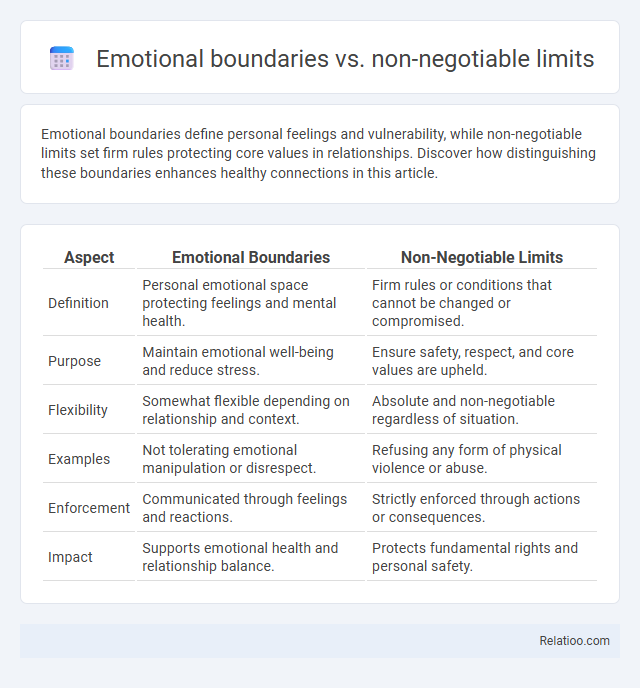Emotional boundaries define personal feelings and vulnerability, while non-negotiable limits set firm rules protecting core values in relationships. Discover how distinguishing these boundaries enhances healthy connections in this article.
Table of Comparison
| Aspect | Emotional Boundaries | Non-Negotiable Limits |
|---|---|---|
| Definition | Personal emotional space protecting feelings and mental health. | Firm rules or conditions that cannot be changed or compromised. |
| Purpose | Maintain emotional well-being and reduce stress. | Ensure safety, respect, and core values are upheld. |
| Flexibility | Somewhat flexible depending on relationship and context. | Absolute and non-negotiable regardless of situation. |
| Examples | Not tolerating emotional manipulation or disrespect. | Refusing any form of physical violence or abuse. |
| Enforcement | Communicated through feelings and reactions. | Strictly enforced through actions or consequences. |
| Impact | Supports emotional health and relationship balance. | Protects fundamental rights and personal safety. |
Understanding Emotional Boundaries
Understanding emotional boundaries involves recognizing and respecting personal limits that protect one's emotional well-being, distinguishing them from non-negotiable limits which are firm rules or values that must not be violated. Emotional boundaries regulate how much emotional energy is shared or absorbed in relationships, helping prevent codependency and emotional burnout. Non-negotiable limits serve as clear lines that define unacceptable behavior, whereas emotional boundaries are more fluid, requiring awareness and communication to maintain healthy interpersonal dynamics.
Defining Non-Negotiable Limits
Non-negotiable limits define the essential boundaries that protect your core values and well-being, distinguishing them from flexible emotional boundaries that adapt to circumstances. Unlike general emotional boundaries, non-negotiable limits are steadfast rules you refuse to compromise, ensuring your personal safety and integrity. Clear identification and unwavering enforcement of these limits empower you to maintain respect and prevent emotional harm in relationships.
Key Differences Between Emotional Boundaries and Non-Negotiable Limits
Emotional boundaries define personal comfort zones regarding feelings and interactions, helping individuals protect their emotional well-being by setting limits on how others can affect their emotions. Non-negotiable limits are stricter rules tied to core values or safety that cannot be compromised under any circumstance, often linked to fundamental personal or ethical standards. The key difference lies in emotional boundaries managing emotional interactions and responsiveness, while non-negotiable limits enforce critical, unwavering restrictions essential for personal integrity or survival.
Why Emotional Boundaries Matter in Relationships
Emotional boundaries are essential in relationships because they protect individual feelings and prevent emotional exhaustion by clearly defining what is acceptable behavior and what is not. Non-negotiable limits refer to core values or deal-breakers that a person refuses to compromise on, helping maintain personal integrity and respect within the relationship. Establishing these boundaries supports healthy communication, reduces conflicts, and fosters mutual trust and understanding between partners.
The Role of Non-Negotiable Limits in Self-Respect
Non-negotiable limits serve as essential markers that protect your self-respect by clearly defining what behaviors and actions you will not tolerate from others, preventing emotional exhaustion. Unlike emotional boundaries, which are flexible and situational, these limits remain firm to uphold your personal values and integrity. Establishing and maintaining non-negotiable limits fosters a strong sense of self-worth and promotes healthier interpersonal relationships.
Signs Your Emotional Boundaries Are Being Crossed
Signs your emotional boundaries are being crossed include feeling drained, anxious, or guilty after interactions, and noticing others dismissing your feelings or personal space. Non-negotiable limits represent firm rules you establish to protect your well-being, such as refusing to tolerate disrespect or manipulation. Emotional boundaries differ by focusing on your internal feelings and limits, while non-negotiable limits emphasize absolute, uncompromising standards essential for mental health and self-respect.
When to Set Non-Negotiable Limits
Setting non-negotiable limits is essential when situations threaten your mental health, personal values, or well-being, ensuring clear boundaries that protect your sense of self. These limits differ from emotional boundaries by being firm rules you refuse to compromise on, such as the necessity for respect or safety. You must establish non-negotiable limits early in relationships or challenging scenarios to prevent manipulation, stress, or emotional exhaustion.
Communicating Boundaries and Limits Effectively
Communicating emotional boundaries requires clear, assertive language that defines personal feelings and comfort zones without ambiguity. Non-negotiable limits must be conveyed firmly to establish unavoidable rules that protect one's well-being and core values. Effective communication of these boundaries and limits involves consistent reinforcement and active listening to ensure mutual understanding and respect in relationships.
Common Challenges in Maintaining Boundaries
Common challenges in maintaining emotional boundaries, non-negotiable limits, and firm non-negotiables include clear communication, inconsistent enforcement, and external pressure from relationships or environments. You may struggle with guilt or fear of conflict when asserting your limits, making it difficult to uphold boundaries consistently. Emotional awareness and assertiveness are key to overcoming these obstacles and protecting your well-being effectively.
Building Healthy Relationships Through Boundaries and Limits
Emotional boundaries define the space where individuals protect their feelings and maintain personal integrity, preventing emotional exhaustion and manipulation in relationships. Non-negotiable limits refer to strict personal rules that safeguard core values and well-being, acting as essential pillars in healthy relationship dynamics. Establishing and respecting these emotional boundaries and non-negotiable limits fosters trust, mutual respect, and effective communication, which are critical for building and sustaining healthy relationships.

Infographic: Emotional boundaries vs Non-negotiable limits
 relatioo.com
relatioo.com